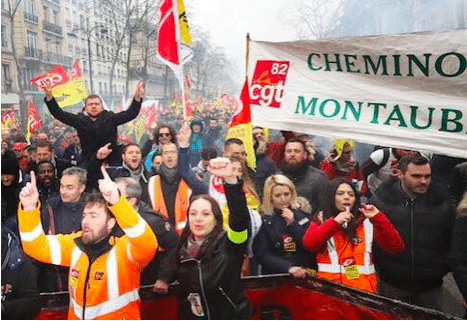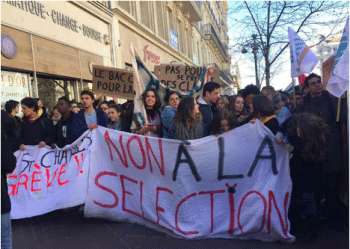Just fifty years ago on March 22nd we saw the beginning of the events in France which terrified the ruling class, led to one of the biggest general strikes ever, along with a wave of factory occupations, and could only be calmed by important concessions from the bosses (minimum wage raised by 35% and new workplace organising rights guaranteed for trade unions). For the first time for decades, the spectre of revolution in the West seemed real.
Today in France, commemorations are everywhere. The fine arts academy in Paris is hosting an exhibition of Trotskyist and anarchist posters, the mainstream radio is running 1968 chat shows. Even the association of university lecturers in anglophone studies is holding its conference under the title “Revolutions” and inviting Angela Davis as keynote speaker (though this hasn’t stopped some colleagues complaining that they might have difficulty getting to the conference because of “these bloody strikes”).
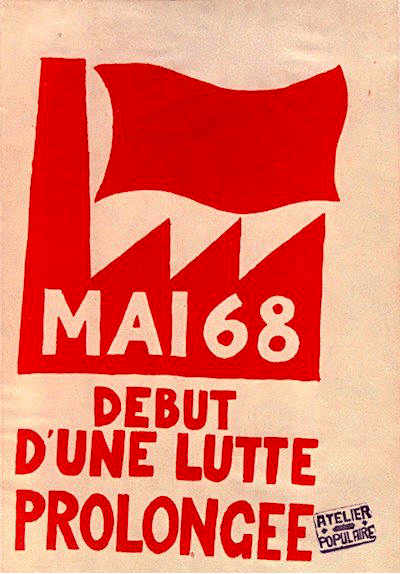
‘May 68: Beginning of a long fight’ original 1968 poster referring to the mass strike on that day. Photo: Twitter/@labasofficielMarch 22 protests across France as rail, civil service and air traffic workers went on strike. Photo: Twitter/@fvicenteprieto
There is a commemoration battle going on, as the mainstream press aims at giving a sterilised view of a student movement mostly based on men wanting to get into women’s dormitories and writing poetic graffiti, while the Left emphasizes the insurrectional situation which led General de Gaulle to flee to Germany to check on the loyalty of French troops stationed there. A few leaders who were thrown up by the movement in 1968 but have since moved to the other side of the barricades and are supporting Macron (like Daniel Cohn Bendit) are busy giving heartfelt interviews.
The best commemoration possible would be a similar explosion today, which both radical left leader Jean-Luc Mélenchon of La France Insoumise (France in Revolt) and Trotskyist leader Olivier Besancenot are calling for. There are plenty of reasons for an uprising, and every week President Macron creates new ones. A clampdown on the unemployed, stopping benefits if job offers, however inappropriate, are refused, was last week’s novelty. But it is the plan to smash up the nationalised railways, and to restrict young people’s rights to enter university, which are at the centre of a mushrooming fightback.
Mass strikes
Though neoliberalism has gnawed away at working conditions, pensions and public services over the last thirty years, a combative working class in France has been able to slow the process down.
Workers retire earlier than in the UK, benefit claimants are under less pressure, university enrolment is still practically free, social housing is still being built in many towns, and so on. French bosses are increasingly impatient to catch up–in neoliberal terms–with the UK.

CGT union railway workers on strike on 22 March over pension cuts, labour rights and privatisation. Photo: Twitter/@cgtcheminotsmtb
Socialist Party president François Hollande, in office from 2012 to 2017 forced through neoliberal laws slashing pensions and making it easier to sack workers. Macron is accelerating this process, as well as avoiding parliamentary debate by using presidential decrees. Last year despite millions on the streets, he pushed through vicious policies tearing up many labour protection rules.
At the centre of Macron’s plan for the rail is his attempt to destroy railway employees’ pension rights and working conditions. Most on the railway can retire younger than those in other sectors, and they have free travel: these rights were won by hard struggle and are seen as some compensation for the low pay and the unsocial and unhealthy hours which must be worked to run a national rail network in a large country. But the neoliberal rail plan also aims at closing down hundreds of local train lines, and introducing competition from private train companies, as imposed by the European Union regulations.
Macron is hoping in the medium-term to privatize the passenger railways (and freight rail is already partly private). But at least as important is his desire to smash the rail unions, the strongest in the country. This conflict could become for him what the miners’ strike was for Thatcher, a symbol of, as Le Monde said last week “his capacity to transform the country”.
Yet Macron is not having it easy. On March 22nd, railway workers, teachers, airport staff, hospital workers and many others struck for the day. Over half a million demonstrated in 150 towns across France. Railway union leaders, in an unprecedented move, have announced thirty days of strikes from today (Tuesday 3rd April), at a rate of a two-day strike every five days, from April to June. The CGT union federation has called one-day strikes across the economy for the 3rd, joined by airline unions and electricity employees, and refuse collection workers have called an indefinite strike from April 3rd, too. Big strikes in hospitals and supermarkets this week add to the stormy atmosphere.
The choice of the rolling strikes for the rail (when many activists would have preferred an all-out indefinite walkout) was made partly in the hope that it would allow strikers to last for longer, but mainly with the aim of maintaining unity among rail union leaderships with differing political perspectives (one of the long-term weaknesses of the French union movement is that in most trades more than one union is present, and inter-union competition is not infrequent). For the moment, the rail unions are in a united front. But of course the rolling nature of the strikes will make it easier for management to organise.
Train workers are very determined: attendance at mass meetings is high, and people are ready for a long strike. Many supervisors and even middle management are supporting (17% of them struck on March 22nd). Top management is panicky, and setting up innovative antistrike schemes, like paying « driver buddies » to accompany non-striking drivers in their cabin on strike days « to help maintain morale »).
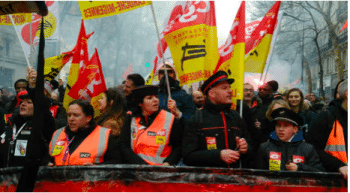 Action from other workers will be crucial, both the spreading of strikes and financial support. There is little tradition of collecting money to help strikers in France. But in some towns, rail users committees are now being set up, and members of La France Insoumise, the NPA and Ensemble (my organisation) as well as Communist Party members are involved in these. An online strike fund to help the railway workers last a long conflict has been set up by a group of well known novelists and other celebrities, and other online strike funds followed suit.
Action from other workers will be crucial, both the spreading of strikes and financial support. There is little tradition of collecting money to help strikers in France. But in some towns, rail users committees are now being set up, and members of La France Insoumise, the NPA and Ensemble (my organisation) as well as Communist Party members are involved in these. An online strike fund to help the railway workers last a long conflict has been set up by a group of well known novelists and other celebrities, and other online strike funds followed suit.
The student movement
A simultaneous movement in the universities could help build a nightmare for Macron.
Students were very much present on the demonstrations on the 22nd March. Universities have been under attack for several years: their presidents have had their salaries doubled and attempts at introducing managerialism into France’s generally democratically-run universities have been accelerating. They have often been stopped by resistance: managerial-type evaluations of lecturers were decided upon ten years ago but are still being boycotted by the vast majority of faculties. Nevertheless, there are ever more short term contracts, and there’s a sore lack of investment, while student numbers are rising.
Although student unions are far weaker today than ten or twenty years ago, a fightback has arisen in a number of key towns, mostly based on resistance to new regulations on entry to university. Before now, a young person who passed the baccalauréat, the national end-of-high-school diploma, had the right to go to the university of their choice. Under the new system, young people must explain why they are applying to any given course, collect reference letters and a report from their high school, and then a selection committee will choose who can have a place.
Fearing revolt, the government has made sure that, for this year at least, few will be refused, but the machinery will be set up to allow far more restrictions to be introduced gradually. Such a scheme can only be an advantage to better-off and better-educated families. Children of lecturers like myself will be at an advantage, but my neighbour’s children (she is from India and works as a cleaner) will have a much harder time.
Several universities are being occupied, and last week the government brought out the heavy artillery in an attempt to defeat the occupation at Toulouse university in the South West of the country. The education minister dissolved the university governing council by decree, and put the institution under the control of a government appointee. The university has been on strike and largely blockaded for months in an attempt to stop a neoliberal project to merge the three universities in Toulouse, as well as to protest against the new selective entry procedures.
Activists from both the NPA and from La France Insoumise have a certain influence in the movement. Mass meetings of up to two thousand people regularly debate strategy, and they are organising to resist a potential police attack on the blockade. Several other universities are organising action in solidarity. The arts faculty at Nancy is blockaded as is one of the universities in Bordeaux. By the end of March at least twelve universities were organising strikes and occupations.

‘We don’t want a bigger slice of the cake. We want the whole f****** bakers’ shop,’ reads a placard at the March 22 protest in Paris over cuts, labour rights and privatisation. Photo: Twitter/@xthree75
In Montpellier on March 22nd a group of masked far-right thugs broke up an occupation with batons, sending several students to hospital, streaming with blood. They appear to have been supported and may even have been organized by the Dean of the law faculty, who has since been forced to resign as Dean and is being detained by the police. Such attacks are a sign of the increasing confidence of fascist groups in the wake of Marine Le Pen’s extremely high vote in last year’s presidential elections.
The Left
Aside from the need for powerful strikes, the question of the building of a political alternative is obviously key.
The organised left has been mobilising support for the different struggles. Twelve organisations signed a joint communiqué in support of the rail workers; these included la France Insoumise, the Communist Party, the Greens and the New Anticapitalist Party (NPA).

The March 22 protest in Paris over cuts, labour rights and privatisation. Photo: Twitter/@commeunbruit
The presidential and legislative elections a year ago set the scene and the political balance of forces for the present. The elections saw a collapse of traditional parties of the Left and the Right. Hollande’s blatant neoliberalism so demoralised his supporters that not only did he not stand, but his then-governing Socialist Party was reduced to a vote of just over six per cent. The Socialist Party is in such deep crisis that its entire youth section has just decided to leave the party! The traditional right, too, was down to around 20% (from 39% in 2007 and 27% in 2012).
Macron was the major winner, managing for a short time to maintain a fiction that he was “neither right nor left”, and getting eight and a half million votes in the first round, before winning the presidency in the second round. The National Front fascists got seven and a half million votes in the first round, thus getting through to the run-off where they got a record ten million.
The candidate of the radical left, La France Insoumise, obtained a score of 19,5% (7 million votes) for a radical programme similar to that of Jeremy Corbyn. The programme included, to name just a few elements, proposals for the following: constitutional changes, nationalisation, taxing the rich, 100% renewable energy, government job creation, the establishment of a maximum salary, a free health service (not the case right now), a massive boost for organic farming, prison reform, a shorter working week, retirement at 60, building a million low-rent homes, leaving NATO, free school canteens and smaller classes.
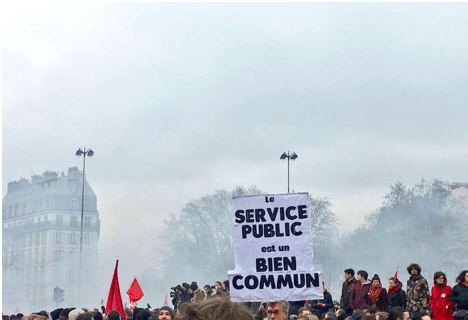
‘Public services are a common good,’ reads a placard on the March 22 protest in Paris over cuts, labour rights and privatisation. Photo: Twitter/@commeunbruit
For the Left, the strong vote for such a radical programme was the key fact of this election. Since then La France Insoumise has been building what they hope will be a new kind of political movement, avoiding both the disastrous compromises with the Socialist Party in local government which the Communist Party has favoured, and the factional traditions of the far left. Their declared aim is to replace the Socialist Party as a party which can win a majority and form a government. What was initially a movement built for running an electoral campaign is now being transformed into an organisation with hundreds of local action groups.
From the point of view of revolutionaries, there are of course plenty of debates to be had. La France Insoumise is close to traditions of left wing patriotism which are tremendously problematic: Mélenchon does not oppose France having nuclear weapons, and feels the country can become a leader in world diplomacy.
The other major problem is the capacity of the ruling class to sabotage such a radical programme, were La France Insoumise to come to government, is very much underestimated. Urgent debate is needed. Further, La France Insoumise, (like all French left organizations scandalously), does not organise actively against Islamophobia, since its activists are so divided on the issue.
![Where is he that Macron I wont let you break my SNCF public rail service reads a placard with an axewielding citizen depicted at March 22 protest over cuts labour rights and privatisation Photo Twittermafalda1722 | MR Online | Where is he that Macron I wont let you break my SNCF public rail service reads a placard with an axe wielding citizen depicted at March 22 protest over cuts labour rights and privatisation Photo Twittermafalda1722 | MR Online'Where is he that Macron? I won't let you break my SNCF [public rail service],' reads a placard with an axe-wielding citizen depicted at March 22 protest over cuts, labour rights and privatisation. Photo: Twitter/@mafalda1722](https://mronline.org/wp-content/uploads/2018/04/Screen-Shot-2018-04-06-at-1.20.52-AM.png)
‘Where is he that Macron? I won’t let you break my SNCF [public rail service],’ reads a placard with an axe-wielding citizen depicted at March 22 protest over cuts, labour rights and privatisation. Photo: Twitter/@mafalda1722
This sectarianism is not due to personal defects of French Trotskyists but to a common theoretical position which considers that Left reformism can no longer exist in late capitalism. Following this incorrect analysis, many anti-capitalists here claim Mélenchon is only pretending to want radical change. Coverage about Mélenchon in the New Anticapitalist Party newspaper, for example, has been consistently sectarian.
This is dangerous because it has led to debates focused on Melenchon’s personality, thus both playing into the mass media’s vicious campaigns of slander against Mélenchon and making the real discussions necessary with reformist activists far more difficult.
And this is despite the fact that a couple of thousand revolutionary activists are doing all they can to build support for the strikes.
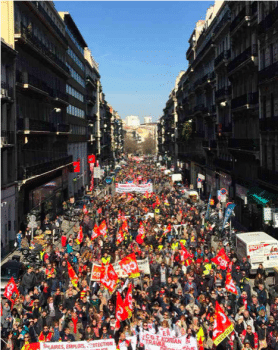
The March 22 protest in Paris over cuts, labour rights and privatisation. Photo: Twitter/@JLMelenchon
Revolt in the balance
One of the key characteristics of the May 68 uprising is that no-one predicted it; so there is no way of knowing what kind of explosion is going to happen this year.
Polls show that 62% of young people would like a generalised revolt, that half the population support the railway workers, and so on. But no-one has a crystal ball.
Macron is losing popularity: at present at 40% of positive opinions in polls.
A workers’ victory, which shows that another France is possible could wipe the smile off his face.
The fascist Front National, for its part, has far less to say to workers when they are in struggle, but is patiently building its party up, trying to make the most of the record ten and a half million votes obtained by Marine Le Pen in the second round of the presidential elections last year.
A combative mass left movement, which La France Insoumise could help bring about, is the best defence against the encroaching of fascist ideas and organisation.
All the ingredients are present, but no one can be sure what will happen next.


